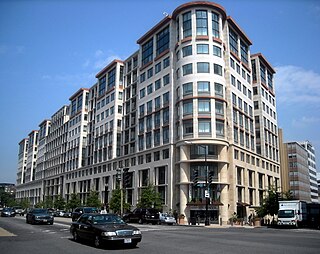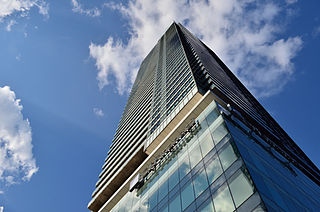
The Federal Reserve System is the central banking system of the United States. It was created on December 23, 1913, with the enactment of the Federal Reserve Act, after a series of financial panics led to the desire for central control of the monetary system in order to alleviate financial crises. Over the years, events such as the Great Depression in the 1930s and the Great Recession during the 2000s have led to the expansion of the roles and responsibilities of the Federal Reserve System.

State Street Corporation is an American global financial services and bank holding company headquartered at One Congress Street in Boston with operations worldwide. It is the second-oldest continually operating United States bank; its predecessor, Union Bank, was founded in 1792. State Street is ranked 14th on the list of largest banks in the United States by assets. It is one of the largest asset management companies in the world with US$3.7 trillion under management and US$40.0 trillion under custody and administration in 2023. It is the largest custodian bank in the world, providing securities services and it is considered a systemically important bank by the Financial Stability Board. Along with BlackRock and Vanguard, State Street is considered to be one of the Big Three index fund managers that dominate corporate America.

The International Finance Corporation (IFC) is an international financial institution that offers investment, advisory, and asset-management services to encourage private-sector development in less developed countries. The IFC is a member of the World Bank Group and is headquartered in Washington, D.C. in the United States.

A commodity market is a market that trades in the primary economic sector rather than manufactured products, such as cocoa, fruit and sugar. Hard commodities are mined, such as gold and oil. Futures contracts are the oldest way of investing in commodities. Commodity markets can include physical trading and derivatives trading using spot prices, forwards, futures, and options on futures. Farmers have used a simple form of derivative trading in the commodities market for centuries for price risk management.
An index fund is a mutual fund or exchange-traded fund (ETF) designed to follow certain preset rules so that it can replicate the performance ("track") of a specified basket of underlying investments. While index providers often emphasize that they are for-profit organizations, index providers have the ability to act as "reluctant regulators" when determining which companies are suitable for an index. Those rules may include tracking prominent indices like the S&P 500 or the Dow Jones Industrial Average or implementation rules, such as tax-management, tracking error minimization, large block trading or patient/flexible trading strategies that allow for greater tracking error but lower market impact costs. Index funds may also have rules that screen for social and sustainable criteria.

Fidelity Investments, formerly known as Fidelity Management & Research (FMR), is an American multinational financial services corporation based in Boston, Massachusetts. Established in 1946, the company is one of the largest asset managers in the world, with $5.8 trillion in assets under management, and $15.0 trillion in assets under administration, as of September 2024, Fidelity Investments operates a brokerage firm, manages a large family of mutual funds, provides fund distribution and investment advice, retirement services, index funds, wealth management, securities execution and clearance, asset custody, and life insurance.
An exchange-traded fund (ETF) is a type of investment fund that is also an exchange-traded product, i.e., it is traded on stock exchanges. ETFs own financial assets such as stocks, bonds, currencies, debts, futures contracts, and/or commodities such as gold bars. Many ETFs provide some level of diversification compared to owning an individual stock.
The Vanguard Group, Inc. is an American registered investment advisor founded on May 1, 1975, and based in Malvern, Pennsylvania, with about $9.3 trillion in global assets under management as of May 2024. It is the largest provider of mutual funds and the second-largest provider of exchange-traded funds (ETFs) in the world after BlackRock's iShares. In addition to mutual funds and ETFs, Vanguard offers brokerage services, educational account services, financial planning, asset management, and trust services. Several mutual funds managed by Vanguard are ranked at the top of the list of US mutual funds by assets under management. Along with BlackRock and State Street, Vanguard is considered to be one of the Big Three index fund managers that play a dominant role in corporate America.

BlackRock, Inc. is an American multinational investment company. Founded in 1988, initially as an enterprise risk management and fixed income institutional asset manager, BlackRock is the world's largest asset manager, with US$11.5 trillion in assets under management as of December 31, 2023. Headquartered in New York City, BlackRock has 70 offices in 30 countries, and clients in 100 countries.
In finance, assets under management (AUM), sometimes called fund under management, refers to the total market value of all financial assets that a financial institution—such as a mutual fund, venture capital firm, or depository institution—or a decentralized network protocol manages and invests, typically on behalf of its clients. Funds may be managed for clients, platform users, or solely for themselves, such as in the case of a financial institution which has mutual funds or holds its own venture capital. The definition and formula for calculating AUM may differ from one entity to another.
A community development financial institution (US) or community development finance institution (UK) - abbreviated in both cases to CDFI - is a financial institution that provides credit and financial services to underserved markets and populations, primarily in the USA but also in the UK. A CDFI may be a community development bank, a community development credit union (CDCU), a community development loan fund (CDLF), a community development venture capital fund (CDVC), a microenterprise development loan fund, or a community development corporation.
State Street Global Advisors (SSGA) is the investment management division of State Street Corporation founded in 1978 and the world's fourth largest asset manager, with nearly US$4.1 trillion in assets under management as of December 31, 2023. SSGA operates through State Street Global Advisors Trust Company, which is a subsidiary of State Street Bank and Trust Company.

The American subprime mortgage crisis was a multinational financial crisis that occurred between 2007 and 2010 that contributed to the 2007–2008 global financial crisis. The crisis led to a severe economic recession, with millions losing their jobs and many businesses going bankrupt. The U.S. government intervened with a series of measures to stabilize the financial system, including the Troubled Asset Relief Program (TARP) and the American Recovery and Reinvestment Act (ARRA).
Keefe, Bruyette & Woods, Inc., a Stifel Company, is an investment banking firm headquartered in New York City, specializing exclusively in the financial services sector. KBW's primary business lines include research, corporate finance, equity sales and trading, equity capital markets, debt capital markets, and asset management.
Impact investing refers to investments "made into companies, organizations, and funds with the intention to generate a measurable, beneficial social or environmental impact alongside a financial return". At its core, impact investing is about an alignment of an investor's beliefs and values with the allocation of capital to address social and/or environmental issues.

Amundi is a French asset management company. With €2 trillion of assets under management (AUM) at the end of 2021, it is the largest asset manager in Europe and one of the 10 biggest investment managers in the world.
SoFi Technologies, Inc. is an American personal finance and financial technology company. Founded in 2011 at Stanford University, it operates as a direct bank and supports other financial institutions through its technology platform. As of 2024, SoFi reports 9.4 million customers and 160 million platform accounts.

Digital Currency Group Inc. (DCG) is a venture capital company focusing on the digital currency market. It is located in Stamford, Connecticut. The company has the subsidiaries Foundry, Genesis, Grayscale Investments, and Luno. It also formerly owned CoinDesk.

CI Financial is a Canadian investment management company based in Toronto, Ontario. It offers investment management and wealth management services targeted to high net worth retail investors, as well as brokerage and trading services to portfolio managers and institutional investors.

ARK Investment Management LLC is an American investment management firm based in St. Petersburg, Florida, that manages several actively managed exchange-traded funds (ETFs). It was founded by Cathie Wood in 2014. At the height of February 2021, the company had US$50 billion in assets under management. As of October 2023, assets had dropped to $6.71 billion, after a period of poor performance.










